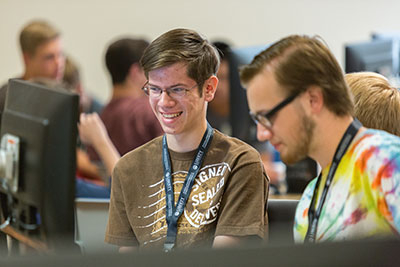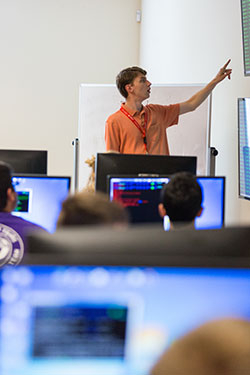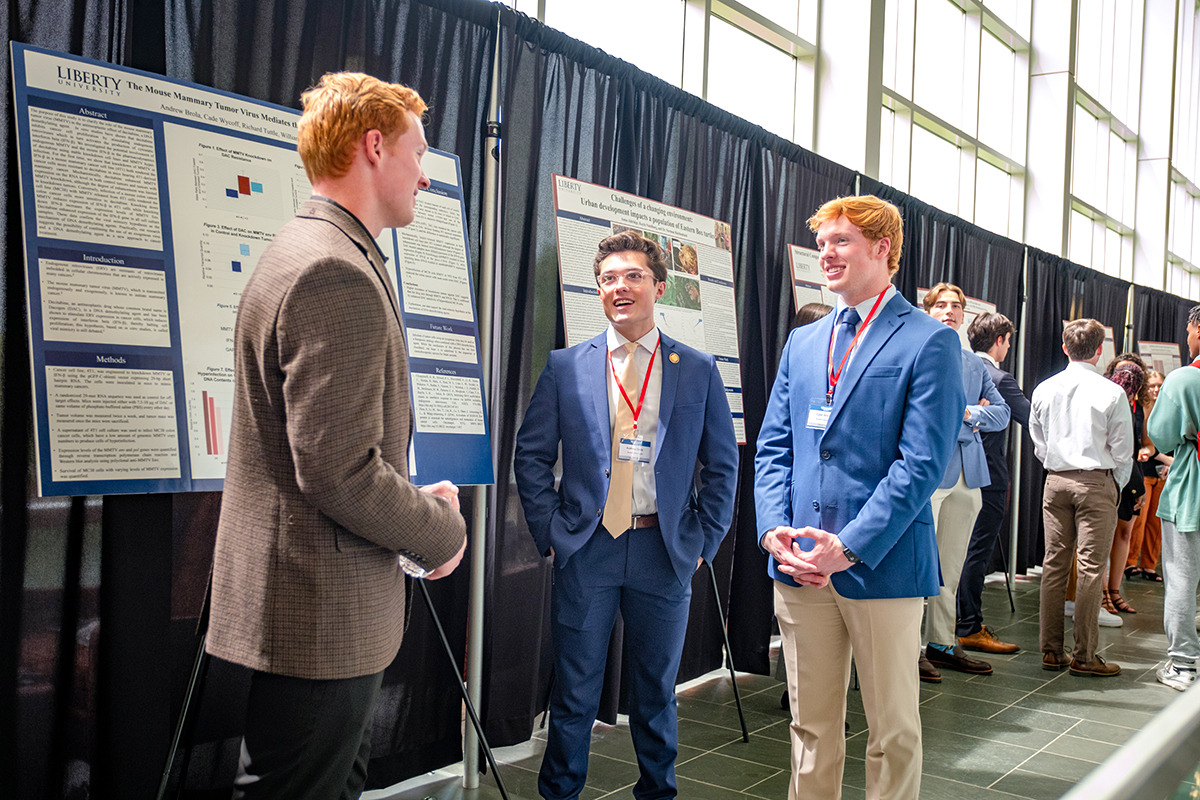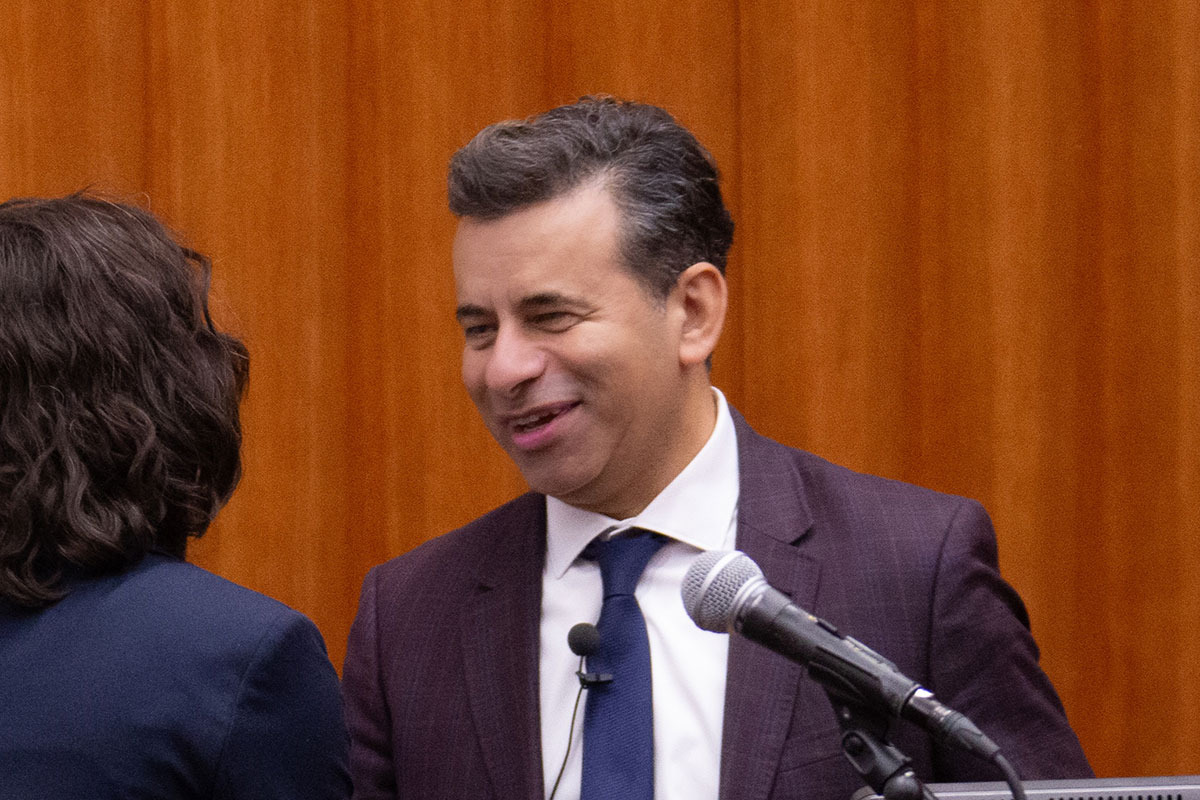Search News Archives
Filter News Articles
Additional Navigation
GenCyber campers train for success in digital combat
July 21, 2016 : By Ted Allen - Office of Communications & Public Engagement

Protecting the free world from cyberterrorist threats and common computer hackers is the job of cybersecurity professionals, a workforce Liberty University is promoting through this week’s GenCyber camp, hosted by the School of Engineering & Computational Sciences (SECS) in DeMoss Hall.
The camp, jointly developed and funded by the National Security Agency (NSA) and the National Science Foundation (NSF), introduces high school students to the basics of cybersecurity, with the “intent of inspiring the next generation of cyber stars,” according to the GenCyber website.
“It’s a pretty hot field right now,” said Dr. Mark Shaneck, director of Liberty’s Center for Cyber Security (LUCCS) and lead instructor for the camp.
This is the first year that Liberty, one of 43 participating universities nationwide, has received a grant to stage the free camp. Students must apply and be accepted. Liberty welcomed 33 students, arriving from as far away as Texas and Florida, but mostly from Maryland, North Carolina, Pennsylvania, and Virginia.
Katya Lopez, a graduate student at Norwich (Vt.) University who has worked on cases with the FBI over the past two years, was hired as a camp consultant. She serves as a mentor to the staff of instructors — both SECS professors and outside professionals — who are training participants through classroom lectures and hands-on activities in the computer lab.
She said the students’ experience levels vary greatly, but their creativity and inquisitiveness is boundless.

“We’ve seen some who only know how to use a computer for social media and updating their iPhone to people who have created virtual machines and built computers themselves,” Lopez said. “So it’s a good range and everyone’s helping each other.”
“The potential in this room is phenomenal,” she added after Tuesday’s afternoon session. “They’re willing to learn, they’re eager to learn, and definitely willing to ask questions and get a better understanding for themselves.”
She said there are tremendous career opportunities for cybersecurity graduates. Camps such as these help spark interest in a field rarely taught in public high schools — a field that currently faces a shortage of more than half a million workers.
“It’s a great field because you don’t have to be a genius,” Lopez said. “You can enter this field with little to no experience and learn in the environment. You just have to have the drive and the will to actually want to learn.”
Joseph Eckhart, a security engineer for Bon Secours Health Systems in Richmond, Va., who will enroll in Liberty’s graduate cybersecurity program this fall, is volunteering at this week’s camp.
“You can never learn enough about this stuff, so every volunteering or training event I do, I’m always learning something new,” said Eckhart, who has more than 20 years of information technology experience.
“We’re trying to make it as fun as we can make it and a positive experience for the students so it’ll pique their interest,” Eckhart said. “For us as facilitators, we try to help them through a problem without giving them the answer because we want them to think and engage and not just tell them what it is.”
Fun activities have ranged from Monday’s “Random Computer Part Jeopardy” to Thursday’s “QR Code Scavenger Hunt.” The camp will conclude with a cybersecurity simulation event on Friday in which students will defend their systems against a live attack from a “red team” of hackers.
“That’s the test by fire, so to speak,” said Shaneck, who is leading Thursday’s session on cryptography.
His staff includes Associate Professor of Computer Science Rick Bansley; Ryan Heathcote (’13, B.S. in Computer Science), a software developer at Lynchburg, Va., startup Sharptop Co.; Don Evatt, a security professional and online adjunct professor; and Karch Frankenfield (’11, B.S. degrees in Computer Science and Biblical Studies), Liberty’s head of web security.
Shaneck compared the information overload that the students are receiving to drinking from a firehose.
“We’re going to give them a lot of information to try to get them ready on Friday for a red team attack,” he said. “That’s four days. People train for years to be ready for that kind of thing, so you’re not going to be (completely) ready. We just tell them to stay positive and try to get whatever they can out of it.”The camp has enlisted seven outside hackers, including two Liberty alumni and three members of the 780th military intelligence brigade, who work for the NSA.For Friday’s simulation, which is open to parents, all factors will work in favor of the hackers over the young cyber defenders.
“The whole game, even in the real world, is slanted toward the attacker, because the defender has to be perfect,” Shaneck said. “As defenders, they have to find all the ways to get in and block them all, whereas the attacker on the red team has to find one way in.”
Liberty has made recent strides in cybersecurity education, launching an online master’s degree in in 2014 that has “grown tremendously,” Shaneck said. Liberty also offers a Cyber Defense Club, which Shaneck coaches. The club won the National Cyberwatch Center Regional Mid-Atlantic Collegiate Cyber Defense Competition (MACCDC) in early April to qualify for the 2016 Raytheon National Collegiate Cyber Defense Competition (CCDC) in San Antonio.


